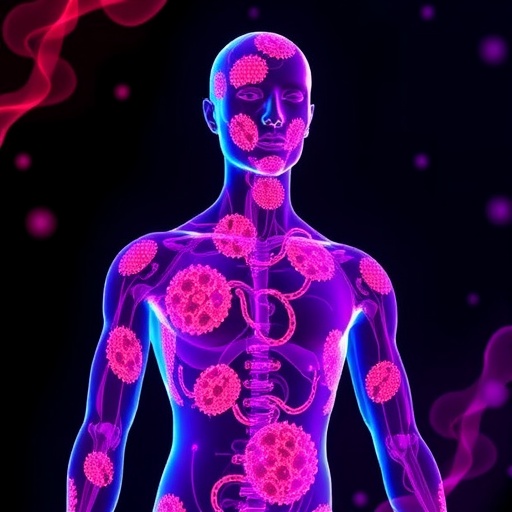Groundbreaking study from Melbourne unveils how feminizing hormone therapy reshapes the plasma proteome in transgender women, aligning biological markers with gender identity
Recent research spearheaded by the Murdoch Children’s Research Institute (MCRI) in collaboration with the University of Melbourne has revealed compelling evidence that feminizing gender-affirming hormone therapy induces profound remodeling of plasma proteins, shifting the molecular landscape within the body to better mirror a person’s gender identity. This work not only deepens our mechanistic understanding of hormone-driven biological plasticity but also opens novel pathways for personalized medical management in transgender healthcare.
The study meticulously analyzed over 5,000 distinct blood proteins from 40 adult transgender women undergoing feminizing hormone therapy, enrolling participants through the Austin Hospital. By comparing plasma protein profiles prior to treatment and after six months, researchers detected significant protein expression changes that realigned these biomarkers towards those typically observed in cisgender women. This pioneering approach leveraged extensive proteomic technologies to capture a comprehensive biological signature of hormone-induced shifts at a molecular level.
Remarkably, among the proteins significantly altered were key biomarkers linked to reproductive function and endocrine regulation. The researchers noted a pronounced decrease in proteins traditionally associated with male reproductive physiology and fertility. Concurrently, they observed elevated expression of proteins integral to lipid metabolism, breast tissue development, immune system modulation, and cardiovascular health. These dual-directional changes underscore the potent systemic influence of sex hormones beyond mere phenotypic characteristics.
Associate Professor Boris Novakovic of MCRI emphasized that the findings illustrate the plasticity of human biology well into adulthood. “Our results demonstrate that gender-affirming hormone therapy remodels critical plasma proteins responsible for sexually dimorphic traits,” he explained. “This dynamic modulation of blood biomarkers reflects the clinical effects observed and may consequentially adjust disease susceptibility profiles in transgender women, including autoimmune and cardiovascular disorders.”
Intriguingly, the protein alterations noted in trans women undergoing hormone therapy paralleled those documented in cisgender women receiving hormone replacement therapy for menopausal symptoms. This parallelism not only validates the biological relevance of the observed proteomic shifts but also reinforces the concept that exogenous hormones can recalibrate internal molecular milieus along sex-specific lines, offering broader insights into hormone biology.
Utilizing a vast reference dataset from a UK biobank comprising over 55,000 individuals, the study robustly benchmarked the proteomic changes against normative sex-specific protein expressions. This comparative analysis affirmed that feminizing hormone treatment can effectively realign the plasma proteome of transgender women, erasing many typical male-female protein expression disparities. These insights pave the way for revisiting clinical guidelines around biomarker interpretations and diagnostic criteria specific to transgender populations.
The investigators highlight the clinical implications inherent in these biological remodelings. Given the altered immune-related biomarkers, the modulation of risk for allergic and autoimmune diseases—which generally exhibit higher prevalence in females—may increase. Conversely, a potentially reduced risk of cardiovascular disease, historically more common in males, emerges as a notable consequence. Such nuanced shifts in disease susceptibility underscore the necessity for sophisticated, gender-sensitive healthcare models tailored to the unique physiological trajectories of trans individuals.
Professor Ada Cheung, head of the Trans Health Research Group at the University of Melbourne, accentuates the translational potential of these findings. She envisions a future wherein continuous proteomic monitoring could revolutionize the personalization of hormone therapy regimens. “By tracking protein biomarkers dynamically, clinicians might better calibrate hormone dosages, preemptively identify cardiovascular or immunological side effects, and enhance overall treatment efficacy,” Cheung noted. “This proteomic perspective heralds a transformative era in transgender medicine, blending molecular diagnostics with individualized care.”
The researchers contend that existing healthcare protocols for transgender patients warrant significant revision. Beyond acknowledging gender identity, medical management must incorporate detailed molecular phenotyping to anticipate and mitigate long-term health risks associated with hormone therapy. Emerging proteomic technologies could become indispensable tools for longitudinal health surveillance, facilitating early interventions before the onset of adverse outcomes.
The study’s rigorous longitudinal design and high-throughput proteomic analysis mark an impressive advancement in sex hormone research. Prior models often relied on hormonal levels alone, but this protein-centric approach captures downstream physiological effects with unprecedented resolution. Such comprehensive molecular profiling sets a new standard for studying endocrine therapies not only in transgender care but also in broader contexts involving hormone modulation.
This inquiry propels the field towards a refined understanding of sex hormone interaction with human biology. The evidence asserts that even beyond developmental windows, systemic hormone fluctuations can pivotally alter foundational biological signatures. These insights challenge static views of sex differences and emphasize a continuum of hormonal influence with profound health implications, underscoring the need for flexible clinical paradigms that integrate gender diversity.
Published in the prestigious journal Nature Medicine, this study stands as a landmark contribution to both endocrinology and transgender health research. Its revelations about the malleability of the plasma proteome in response to feminizing hormone therapy offer hope for optimized treatments that honor the complexity of human identity while enhancing quality of life and health outcomes for transgender individuals worldwide.
Subject of Research: People
Article Title: Remodelling of the plasma proteome by sex hormones in a longitudinal clinical trial of feminizing gender-affirming hormone therapy
News Publication Date: 20-Oct-2025
Web References:
DOI: 10.1038/s41591-025-04023-9
References:
Nhi NL Nguyen, Den Celestra, Lachlan M. Angus, Toby Mansell, Rebecca Shepherd, Bo Won Kim, Bridget Arman, Georgiana Cabau, Tania O. Crișan, Leo A. B. Joosten, Camille Laberthonnière, David Burgner, Gilda Tachedjian, Musa Mhlanga, Rachel A. Davey, Ken C. Pang, Ada S. Cheung, Richard Saffery, Boris Novakovic. “Remodelling of the plasma proteome by sex hormones in a longitudinal clinical trial of feminizing gender-affirming hormone therapy.” Nature Medicine, 2025.




